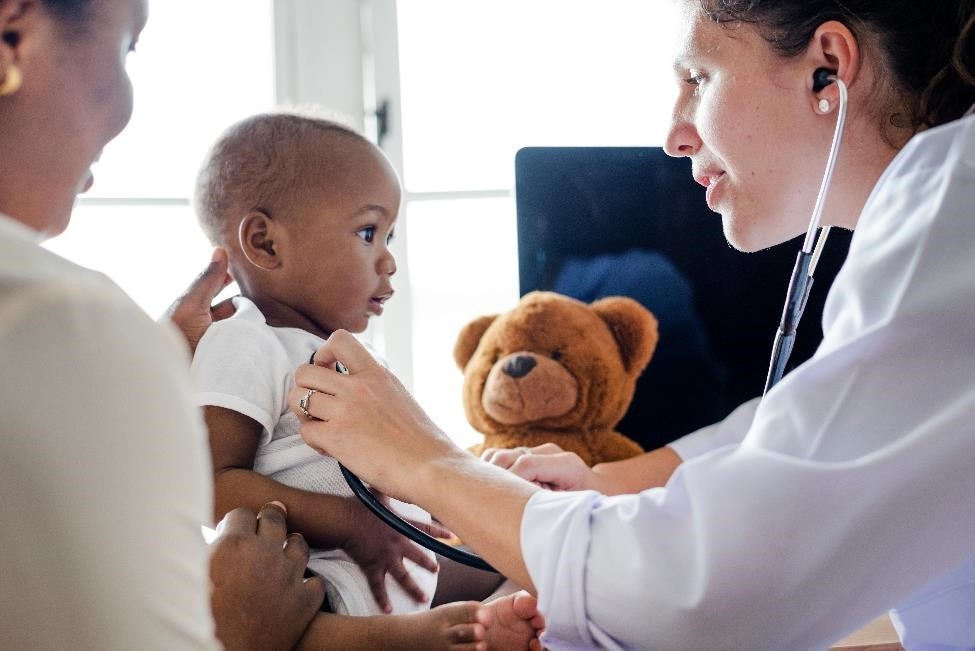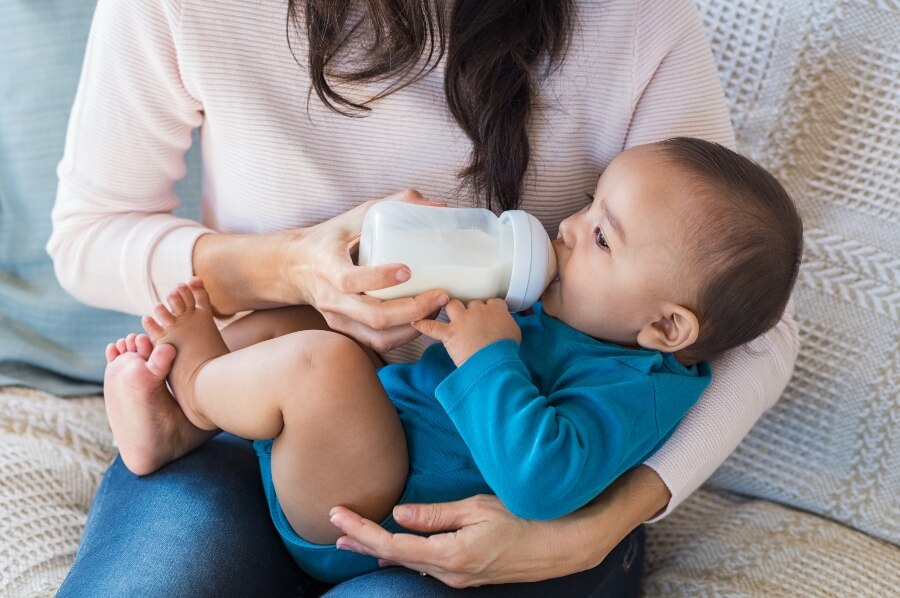Acid Reflux (GER & GERD) in Infants
Return to Overview PageDefinition & Facts
In this section:
- What is GER?
- Does GER have another name?
- How common is GER in infants?
- What is GERD?
- How common is GERD in infants?
- Which infants are more likely to have GERD?
- What are the complications of GERD in infants?
What is GER?
Gastroesophageal reflux (GER) happens when stomach contents come back up into the esophagus. GER often causes regurgitation—stomach contents coming up through the esophagus and into the throat or mouth—and spitting up. Regurgitation and spitting up are normal in infants—babies younger than 1 year old.
 In infants, GER often causes regurgitation and spitting up.
In infants, GER often causes regurgitation and spitting up.Does GER have another name?
Doctors also refer to GER in infants as
- acid indigestion
- acid reflux
- acid regurgitation
- heartburn
- reflux
- spitting up
How common is GER in infants?
GER and regurgitation are common in infants. Regurgitation may occur one or more times each day and is more common in infants younger than 6 months old.1 About 70 to 85 percent of infants have daily regurgitation by the age of 2 months.2 Most children no longer have GER symptoms by the time they are 12 to 14 months old.1
What is GERD?
Gastroesophageal reflux disease (GERD) is a more severe and long-lasting condition in which GER causes repeated symptoms that are bothersome or leads to complications. However, doctors and caregivers may find it difficult to determine whether an infant’s symptoms are bothersome and whether the symptoms are caused by GER or by something else.
If you think your infant has GERD, you should take him or her to see a doctor or a pediatrician.
How common is GERD in infants?
Experts aren’t sure how common GERD is in infants because the condition is difficult to diagnose.
Which infants are more likely to have GERD?
Any infant can have GERD. GERD is more common in premature infants. Infants with certain health conditions that affect the esophagus, nervous system, or lungs are also more likely to have GERD.
What are the complications of GERD in infants?
Infants with GERD may develop complications such as esophagitis, poor weight gain, and complications outside the esophagus. However, some of these complications may be signs of other, unrelated conditions that affect infants. Doctors may check for health problems other than GERD that could be causing these complications.
Esophagitis
Esophagitis is inflammation in the esophagus. Esophagitis may cause ulcers in the lining of the esophagus and bleeding. Over time, chronic esophagitis may increase the chance of developing esophageal stricture and Barrett’s esophagus.
Poor weight gain
Infants with GERD may spit up their food often or refuse to eat. These symptoms can cause an infant to gain less weight than expected or to lose weight.
Complications outside the esophagus
Some infants with GERD also have complications outside the esophagus, in the mouth, throat, or lungs. These complications may include
- cough
- laryngitis—inflammation of the voice box that can lead to a short-term loss of voice
- pneumonia that keeps coming back
- wheezing, a high-pitched whistling sound that happens while breathing
References
[1] Vandenplas Y. Chapter 10: Gastroesophageal reflux. In: Guandalini S, Dhawan A, Branski D, eds. Textbook of Pediatric Gastroenterology, Hepatology, and Nutrition. Springer International Publishing; 2016:105–130.
[2] Czinn SJ, Blanchard S. Gastroesophageal reflux disease in neonates and infants: when and how to treat. Paediatric Drugs. 2013;15(1):19–27. doi:10.1007/s40272-012-0004-2
Symptoms & Causes
What are the symptoms of GER and GERD in infants?
In infants, gastroesophageal reflux (GER) commonly causes
- regurgitation, or stomach contents coming back up through the esophagus and into the throat or mouth
- spitting up
Infants with gastroesophageal reflux disease (GERD) may have regurgitation and spitting up along other signs and symptoms, such as
- arching of the back and abnormal movements of the neck and chin
- choking, gagging, or problems swallowing
- irritability, particularly when it occurs with regurgitation
- loss of appetite or refusing to eat
- complications, such as poor weight gain, cough, or wheezing
- vomiting
However, many conditions other than GERD can cause similar symptoms. Doctors may recommend tests to check for other health problems before diagnosing GERD.
Call a doctor right away if an infant has signs or symptoms that could be related to a serious health problem other than GERD. Examples include
- crying more than usual or being extremely irritable
- failure to thrive, meaning that an infant or a child weighs less or is gaining less weight than expected for his or her age
- problems breathing
- problems swallowing
- signs of bleeding in the digestive tract, such as
- vomit that contains blood or looks like coffee grounds
- rectal bleeding or stool that contains blood
- signs of dehydration, such as no wet diapers for 3 hours or more, or a lack of energy
- vomiting
- in large amounts
- that is regularly forceful, also called projectile vomiting
- with bile in the vomit, which makes the vomit green or yellow in color
- vomiting or regurgitation that begins when an infant is younger than age 2 weeks or older than age 6 months3
What causes GER & GERD in infants?
Experts think several factors lead to GER in infants. For example, in the first 6 months of life, infants spend much of their time lying down and do not have a fully developed esophagus and lower esophageal sphincter.4,5 They also eat meals that are primarily liquid and larger, relative to their body size, than older children or adults do. These factors make it more likely that stomach contents will come back up into the esophagus. As infants spend more time upright, eat more solid foods, and grow and develop, they typically experience less GER.
 As infants grow and develop, they typically experience less GER.
As infants grow and develop, they typically experience less GER.Experts are still studying why some infants develop GERD—a condition in which GER causes repeated symptoms that are bothersome or leads to complications. Several different factors may play a role. For example, infants with GERD may have problems with how the lower esophageal sphincter works, have more acid reflux, or feel more discomfort when GER occurs.
Infants are more likely to have GERD if they have certain health conditions, including
- being born prematurely
- conditions that affect the lungs, such as cystic fibrosis
- conditions that affect the nervous system, such as cerebral palsy
- hiatal hernia, a condition in which the opening in the diaphragm lets the upper part of the stomach move up into the chest
- previous surgery to correct esophageal atresia, a type of birth defect
References
[3] Gonzalez Ayerbe JI, Hauser B, Salvatore S, Vandenplas Y. Diagnosis and management of gastroesophageal reflux disease in infants and children: from guidelines to clinical practice. Pediatric Gastroenterology, Hepatology, and Nutrition. 2019;22(2):107–121. doi:10.5223/pghn.2019.22.2.107
[4] Pados BF, Davitt ES. Pathophysiology of gastroesophageal reflux disease in infants and nonpharmacologic strategies for symptom management. Nursing for Women’s Health. 2020;24(2):101–114. doi:10.1016/j.nwh.2020.01.005
[5] Chabra S, Peeples ES. Assessment and management of gastroesophageal reflux in the newborn. Pediatric Annals. 2020;49(2):e77–e81. doi:10.3928/19382359-20200121-02
Diagnosis
How do doctors diagnose GER and GERD in infants?
In most cases, doctors diagnose gastroesophageal reflux (GER) and gastroesophageal reflux disease (GERD) by reviewing an infant’s symptoms and medical history. If symptoms suggest GER or GERD, doctors may recommend treatment with lifestyle changes before ordering medical tests or prescribing medicines.
If symptoms suggest that an infant may have a GERD complication or a health problem other than GERD, doctors may recommend medical tests. Doctors may also recommend tests or prescribe medicines if symptoms don’t improve after lifestyle changes.
Doctors may refer an infant to a pediatric gastroenterologist to diagnose and treat GERD.
 In most cases, doctors diagnose GER and GERD by reviewing an infant’s symptoms and medical history.
In most cases, doctors diagnose GER and GERD by reviewing an infant’s symptoms and medical history.Doctors may order the following tests to help diagnose GERD. Doctors may order additional tests to check for health problems other than GERD that might be causing an infant’s symptoms.
Upper gastrointestinal (GI) endoscopy
Upper GI endoscopy is a procedure in which a doctor uses an endoscope—a flexible tube with a camera—to see the lining of the upper GI tract, including the esophagus, stomach, and duodenum. During an upper GI endoscopy, a doctor may obtain biopsies by passing an instrument through the endoscope to take small pieces of tissue from the lining of the esophagus. A pathologist will examine the tissue under a microscope. Doctors may order an upper GI endoscopy to check for problems other than GERD or complications of GERD.
Esophageal pH monitoring
Esophageal pH monitoring can detect acid reflux in the esophagus. Health care professionals sometimes combine this test with an impedance monitoring test, which can detect nonacid reflux, during the same procedure.
For the test, a health care professional passes one end of a catheter—a thin, flexible tube—through the nose and into the esophagus. The catheter is connected to a monitor. During monitoring, a parent or caregiver is asked to track information about the infant’s eating, sleeping, and symptoms.
Doctors may order this test to see how eating, sleeping, and symptoms relate to reflux in the esophagus. Doctors may also order this test to find out if GERD medicines are working.
Upper GI series
An upper GI series is a procedure in which a doctor uses x-rays and a chalky liquid called barium to view the upper GI tract. Doctors may order this test to check for problems, such as anatomic problems in the upper GI tract, that may be causing or worsening symptoms.
Treatment
How do doctors treat GER and GERD in infants?
Most infants with GER do not need treatment. GER symptoms typically improve on their own by the time a child is 12 to 14 months old.6 Depending on an infant’s age and symptoms, doctors may recommend lifestyle changes to treat GER or GERD symptoms. In some cases, doctors may also recommend medicines or surgery.
Lifestyle changes
Doctors may recommend lifestyle changes to help improve symptoms of GER or GERD in infants. For example, a doctor may recommend that you
- avoid exposing the infant to secondhand smoke.
- burp your infant more often.
- change the infant’s diet.
- hold the infant upright for 20 or 30 minutes after he or she eats, if practical.7 An infant should always be placed on his or her back for sleep.
 Doctors may recommend lifestyle changes for infants with GER or GERD.
Doctors may recommend lifestyle changes for infants with GER or GERD.Medicines
Doctors may recommend medicines—typically proton pump inhibitors (PPIs) or H2 blockers—if an infant has esophagitis or has bothersome GERD symptoms that don’t improve after lifestyle changes. Don’t give infants medicines unless told to do so by a doctor.
PPIs and H2 blockers lower the amount of acid the stomach makes. Doctors prescribe these medicines to improve GERD symptoms and heal the lining of the esophagus. Infants taking these medicines may have a higher chance of experiencing certain types of infections. Talk with your infant’s doctor about the risks and benefits of these medicines.
Surgery
Doctors don’t often recommend surgery to treat GERD in infants. Doctors may recommend surgery if an infant’s symptoms are severe and other treatments don’t help or if an infant has serious GERD complications. In some cases, infants may need surgery to treat GERD later in childhood.
References
[6] Vandenplas Y. Chapter 10: Gastroesophageal reflux. In: Guandalini S, Dhawan A, Branski D, eds. Textbook of Pediatric Gastroenterology, Hepatology, and Nutrition. Springer International Publishing; 2016:105–130.
[7] Winter HS. Gastroesophageal reflux in infants. UpToDate. Updated October 2, 2019. Accessed March 6, 2020. www.uptodate.com/contents/gastroesophageal-reflux-in-infants
Eating, Diet, & Nutrition
What diet changes may improve GER or GERD symptoms in infants?
Talk with a doctor before changing your infant’s diet to try to treat GER or GERD symptoms. Depending on an infant’s age and symptoms, a doctor may recommend that you
- avoid overfeeding or give smaller, more frequent feedings. Follow the doctor’s directions to make sure your infant gets the right amount of food each day.
- feed your infant thicker food. You child’s doctor may recommend adding cereal to formula or stored breast milk to make it thicker. Don’t change your infant’s food unless a doctor tells you to do so.
- remove cow’s milk protein from the infant’s diet. The symptoms of cow’s milk protein allergy are similar to the symptoms of GER and GERD. For infants who are fed formula, doctors may recommend trying a special formula, called hydrolyzed protein formula, for 2 to 4 weeks.8 For infants who are breastfed, doctors may recommend that mothers change their diets to avoid cow’s milk protein.
Doctors may recommend additional diet changes for infants who have poor weight gain because of GERD. For example, doctors may recommend a higher-calorie formula or feeding an infant through a feeding tube—a thin, flexible tube that carries liquid food into the stomach or small intestine.
 Doctors may recommend changing an infant’s diet to help treat GER or GERD.
Doctors may recommend changing an infant’s diet to help treat GER or GERD.References
[8] Rosen R, Vandenplas Y, Singendonk M, et al. Pediatric gastroesophageal reflux clinical practice guidelines: joint recommendations of the North American Society for Pediatric Gastroenterology, Hepatology, and Nutrition and the European Society for Pediatric Gastroenterology, Hepatology, and Nutrition. Journal of Pediatric Gastroenterology and Nutrition. 2018;66(3):516–554. doi:10.1097/MPG.0000000000001889
Clinical Trials
In this section:
- Why are clinical trials with children important?
- How do I decide if a clinical trial is right for my child?
- What aspects of GER and GERD are being studied in children?
- What clinical studies for GER and GERD are available for child participants?
The NIDDK conducts and supports clinical trials in many diseases and conditions, including digestive diseases. The trials look to find new ways to prevent, detect, or treat disease and improve quality of life.
Why are clinical trials with children important?
Children respond to medicines and treatments differently than adults. The way to get the best treatments for children is through research designed specifically for them.
We have already made great strides in improving children's health outcomes through clinical trials—and other types of clinical studies. Vaccines, treatments for children with cancer, and interventions for premature babies are just a few examples of how this targeted research can help. However, we still have many questions to answer and more children waiting to benefit.
The data gathered from trials and studies involving children help doctors and researchers
- find the best dose of medicines for children
- find treatments for conditions that only affect children
- treat conditions that behave differently in children than in adults
- understand the differences in children as they grow
How do I decide if a clinical trial is right for my child?
We understand you have many questions, want to weigh the pros and cons, and need to learn as much as possible. Deciding to enroll in a study can be life changing for you and for your child. Depending on the outcome of the study, your child may find relief from their condition, see no benefit, or help to improve the health of future generations.
Consider what would be expected. What could be the potential benefit or harm? Would you need to travel? Is my child well enough to participate? Parents or guardians must give their permission, or consent, for their infants to join a study. In the end, no choice is right or wrong. Your decision is about what is best for your child.
The National Institutes of Health (NIH) is committed to ensuring you get all the information you need to feel comfortable and make informed decisions. The safety of children remains the utmost priority for all NIH research studies. For more resources to help decide if clinical trials are right for your child, visit Clinical Trials and You: Parents and Children.
What aspects of GER and GERD are being studied in children?
Researchers study many aspects of gastroesophageal reflux (GER) and gastroesophageal reflux disease (GERD) in infants, including new or improved treatments.
Watch a video of NIDDK Director Dr. Griffin P. Rodgers explaining the importance of participating in clinical trials.
What clinical studies for GER and GERD are available for child participants?
You can find clinical studies on GER and GERD in infants at ClinicalTrials.gov. In addition to searching for federally funded studies, you can expand or narrow your search to include clinical studies from industry, universities, and individuals; however, the National Institutes of Health does not review these studies and cannot ensure they are safe. If you find a trial you think may be right for your child, talk with your child’s doctor about how to enroll.
This content is provided as a service of the National Institute of Diabetes and Digestive and Kidney Diseases
(NIDDK), part of the National Institutes of Health. NIDDK translates and disseminates research findings to increase knowledge and understanding about health and disease among patients, health professionals, and the public. Content produced by NIDDK is carefully reviewed by NIDDK scientists and other experts.
The NIDDK would like to thank:
Carlo Di Lorenzo, M.D., Nationwide Children's Hospital

